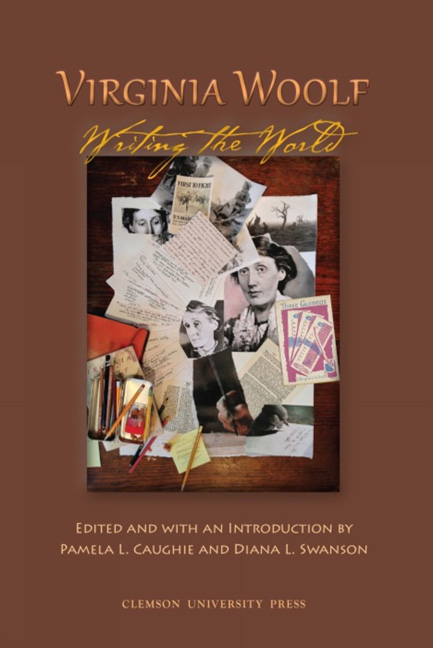Book contents
- Frontmatter
- Table of Contents
- Introduction
- Acknowledgmen
- Abbreviation
- WAR AND PEACE
- Roundtable: Woolf and Violence
- Intersections: Surveillance, Propaganda, and Just War
- Modernism and Memorials: Virginia Woolf and Christopher Isherwood
- Taking Up Her Pen for World Peace: Virginia Woolf, Feminist Pacifist. Or Not?
- The Sex War and the Great War: Woolf's Late Victorian Inheritance in Three Guineas
- Sky Haunting: The British Motor-Car Industry and the World Wars
- The 1914 “Expurgated Chunk”: The Great War in and out of The Years
- “beauty, simplicity and peace”: Faithful Pacifism, Activist Writing, and The Years
- Virginia Woolf, Katharine Burdekin, and Britain's Cosmopolitan Musical Culture
- Death in the Air: Virginia Woolf and Sylvia Townsend Warner in World War II
- WORLD WRITER(S)
- ANIMAL AND NATURAL WORLD
- WRITING AND WORLDMAKING
- Notes on Contributors
- Conference Program
- Appendix: Virginia Woolf Conference Exhibit Items, Newberry Library
The Sex War and the Great War: Woolf's Late Victorian Inheritance in Three Guineas
from WAR AND PEACE
- Frontmatter
- Table of Contents
- Introduction
- Acknowledgmen
- Abbreviation
- WAR AND PEACE
- Roundtable: Woolf and Violence
- Intersections: Surveillance, Propaganda, and Just War
- Modernism and Memorials: Virginia Woolf and Christopher Isherwood
- Taking Up Her Pen for World Peace: Virginia Woolf, Feminist Pacifist. Or Not?
- The Sex War and the Great War: Woolf's Late Victorian Inheritance in Three Guineas
- Sky Haunting: The British Motor-Car Industry and the World Wars
- The 1914 “Expurgated Chunk”: The Great War in and out of The Years
- “beauty, simplicity and peace”: Faithful Pacifism, Activist Writing, and The Years
- Virginia Woolf, Katharine Burdekin, and Britain's Cosmopolitan Musical Culture
- Death in the Air: Virginia Woolf and Sylvia Townsend Warner in World War II
- WORLD WRITER(S)
- ANIMAL AND NATURAL WORLD
- WRITING AND WORLDMAKING
- Notes on Contributors
- Conference Program
- Appendix: Virginia Woolf Conference Exhibit Items, Newberry Library
Summary
Long neglected by critics, Virginia Woolf's indebtedness to the Victorians has come to the attention of recent scholars. Even so, their work tends to focus on her relation to mid-Victorianism. This paper interrogates how Woolf's construction of feminist pacifism in Three Guineas (1938) resonates with late Victorian literary feminism. Specifically, I examine the narrator's internal debate within Three Guineas over whether to reform or burn down the women's college. This dialogue reflects a division among New Woman writers between the reforming vision of Olive Schreiner and the radical tactics of George Egerton. Schreiner and Egerton represent an important tension in feminism between equality and agency and this tension operates as a dialogue in the narrator's pursuit of expanding women's options in the public sphere and resisting war in the private sphere. Woolf's debate with late Victorian feminists informs her critique of modern war as an outsider. When she contextualizes the tyranny of war alongside the tyranny of the separate spheres, the Great War and the sex war of the late nineteenth century become inextricable in Three Guineas .
Many scholars have considered Woolf's use of the past, the way she “thinks back through her mothers” as she contends in A Room of One's Own (1929, 97), but her relation to the Victorians is often seen as oppositional, in part because Woolf herself emphasized these breaks. More recently, critics have analyzed this rich literary and cultural relationship between Woolf and the Victorian past. As Gillian Beer writes, “The Victorians are not simply represented…in her novels…the Victorians are also in Virginia Woolf. They are internalized, inseparable, as well as held at arm's length” (93). I agree with Jessica R. Feldman, who writes that “when modernist writers insist upon radical discontinuity, we should not take them at their word.[…]What is dismissed is also summoned” (454). Seeing the affinities rather than the radical ruptures between New Woman writers and Woolf locates a diff erent kind of Victorian inheritance present in her work. Such an undertaking emphasizes finding resonating ideas, echoes, and imagery, or as Feldman contends, interpreting “patterns” that “link to other patterns” (456).
- Type
- Chapter
- Information
- Virginia Woolf: Writing the World , pp. 43 - 48Publisher: Liverpool University PressPrint publication year: 2015



